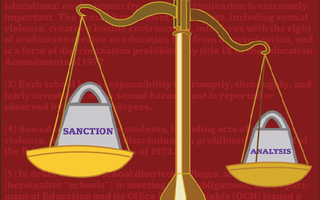{shortcode-ad93522f961fa24c8bcce53297771c61cf983a6b}
The Dean of Students Office will discipline extracurricular groups whose leaders or board members are members of unrecognized single-gender social groups, according to the 2019-2020 policy guidelines provided to student organizations.
“Student Organizations who are found to have elected a member of a USGSO to a leadership position will be put through the Student Organization Discipline process and that student will be removed from the leadership position,” the 2019-2020 Recognized Student Organization Resource and Policy Guide reads.
The College’s social-group sanctions — which took effect with the Class of 2021 — prohibit members of unrecognized single-gender final clubs and Greek organizations from leading campus organizations, holding athletic captaincies, and receiving College endorsement for prestigious fellowships like the Rhodes.
When the policy’s implementation was first announced in March 2018, College administrators said the Administrative Board would adjudicate penalties for individual students found in violation of the policy.
This is the first time, however, that the College has formally documented a disciplinary process for student organizations whose members do not comply with the sanctions. Harvard debuted the Student Organization Discipline process in last year’s iteration of the resource guide. Possible outcomes of this four-step review include loss of access to University facilities and Undergraduate Council funding. The 2018-2019 resource guide did not address the social group policy in its discussion of the new disciplinary procedure.
“This is just another moment where we’re trying to clarify what happens in the process, but we’ve always said that leadership positions and all those things would kind of go through our student org discipline process,” Associate Dean of Student Engagement Alex R. Miller said in an interview Tuesday.
Miller said the DSO provides advising and training to student organizations about all the College’s policies, rather than isolating the sanctions policy as a separate case.
“We don’t give instructions to student organizations, but we do give them guidance on policy,” Miller said. “And so we have done that in several moments, whether it be our student or leadership training. We’ve done it in the actual resource guide, and we also make student organizations certify that they are aware of all policies, not just this one, when they register as a student organization.”
Dean of Students Katherine G. O’Dair said she trusts College students to hold themselves accountable to the policies.
“We place a great deal of trust in our students in our student leadership. We don’t consider it students’ responsibility to enforce University policy,” O’Dair said Tuesday. “That said, students should know that our doors are open if they want to bring concerns to us about any number of policies.”
Miller also said there is no formal process in place for reporting violations of the sanctions policy by student group leaders. The person launching the complaint cannot be anonymous but can be any member of the Harvard community.
“It can be email, it can be a phone call, it would have to be someone coming forward to communicate with our office, whether verbally or in writing, but there is no form,” Miller said.
After the initial report, Miller said that the College would meet with the student in question and “find out more information.”
“We don’t assume anything,” he added.
Miller and O’Dair said they believe the sanctions have propelled a positive “culture shift” on campus.
“I think I’m excited that we have 13 gender-neutral social organizations on campus,” Miller said. “That wasn’t the case, you know, two years ago.”
“I think it’s changing the way students socialize on campus,” he added. “I think now when you ask around what is social life like and how are students engaging, and you hear more like ‘Oh, I’m going to a House event’ or, ‘Oh, I'm going to a CEB event.’ I think that’s what I’m calling a cultural shift.”
The handbook’s new statement on disciplinary action arrives amidst a pair of ongoing state and federal lawsuits claiming that the sanctions infringe upon students’ freedom of association and illegally discriminate on the basis of sex. A judge ruled in August that the federal suit will move forward.
—Staff writer Sanjana L. Narayanan can be reached at sanjana.narayanan@thecrimson.com.
—Staff writer Samuel W. Zwickel can be reached at samuel.zwickel@thecrimson.com. Follow him on Twitter @samuel_zwickel.
Read more in College News
UC Funds First-Generation Faculty Mentorship ProgramRecommended Articles
-
 Harvard Argues Suits Challenging Social Group Sanctions Should Be Dismissed
Harvard Argues Suits Challenging Social Group Sanctions Should Be Dismissed -
 Experts Say Sanctions Lawsuits Are Unlikely to be Immediately Dismissed
Experts Say Sanctions Lawsuits Are Unlikely to be Immediately Dismissed -
 Alleging Sex Discrimination, Greek Organizations Insist Courts Must Hear Social Group Lawsuits
Alleging Sex Discrimination, Greek Organizations Insist Courts Must Hear Social Group Lawsuits -
 In Final Legal Push, Harvard Defends Motions to Dismiss Sanctions Complaints
In Final Legal Push, Harvard Defends Motions to Dismiss Sanctions Complaints -
 Amid Student Lobbying, U.S. Senator Pressures Bacow on Sanctions
Amid Student Lobbying, U.S. Senator Pressures Bacow on Sanctions -
 Bipartisan Group of Lawmakers Introduces Legislation That Could Endanger Harvard’s Sanctions
Bipartisan Group of Lawmakers Introduces Legislation That Could Endanger Harvard’s Sanctions













